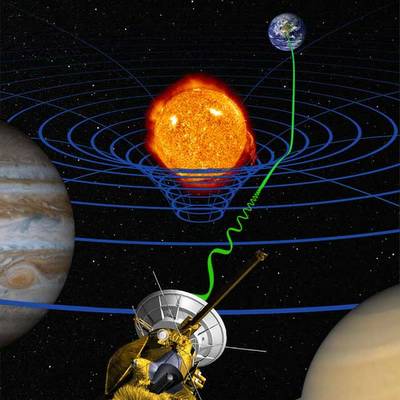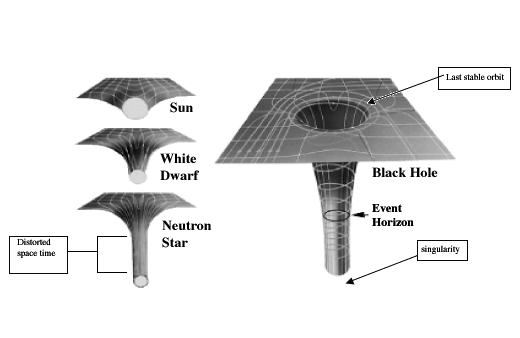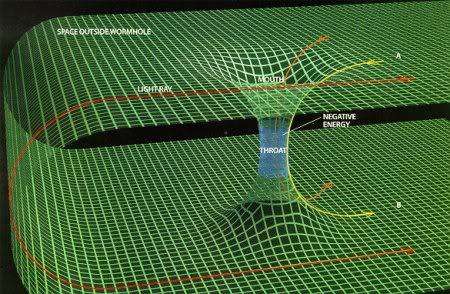God and Time
Posted Mar 11, 2011 by Michael in General
Table of Contents
- Introduction
- General Relativity
- Time is Not Constant
- Eternity
- God is Not Subject to Time
- What is Reality?
- Conclusion
Introduction
I have been interested in the subject of time ever since I heard about the theory of general relativity. I'm particularly interested in how our beliefs about time, affect our beliefs about God. Some argue that Christ could not be divine if He was a Son, because this would mean that there was a time in the past that He didn't exist. Some then change God's word, and make Christ exactly the same as, and not dependent on the Father. It is this issue I'm going to focus on.
We use time as a way to measure things here on Earth, and do so everywhere. Time is used to coordinate meals, public transport, meetings, and so forth, people charge by the hour, projects are given a matter of time for completion, people have birthdays once a year, there are twelve years of school in total, everyone is X years old, we all have clocks to track time; in short time is everywhere here on earth. To our perceptions, time appears as an absolute, linear thing that is just... there.
General Relativity
General relativity is a theory developed by Albert Einstein. In short, this theory states that space and time are morphed by objects of large mass. Spacetime (a term for both space and time) is curved , by objects of large mass, which in turn affects the course of other objects near it.
Let me give you an example. We have a lone object in space, travelling at a certain rate. Because there are no objects around it, it will continue to move straight. Now, add an object of large mass somewhere near it. Spacetime curves, causing our object to curve with it in it's path. The object is really following a straight line, relative to the people on the object (we'll assume the object is big enough) that's what it looks like, however that line of space is being curved by the object of large mass. Here's a pretty good picture for demonstrating the bending of space :

A visualisation of space morphing due to the mass of the Sun.
The fact that time is also morphed by objects of large mass really puts a strange picture on everything. Time progresses slower around objects of large mass. Experiments confirm that time moves slightly slower in the outer sections of the earth's gravitational field .
Black Holes
Black holes are great objects to illustrate general relativity. A black hole is usually caused by gravitational collapse, which occurs when an object's internal pressure can't resist its own gravity . When this happens, the star collapses, causing a huge explosion (called a supernova). The result of this is a black hole.
A black hole has a point in the centre of it, called the singularity. This singularity has zero volume, yet infinite density (mass) , therefore a black hole applies tremendous force on spacetime.
This causes some rather strange things to happen to time. If you were observing me fall into a black hole, I would start to slow down as I got closer to it, and, according to what you see, take an infinite amount of time to reach the black hole. Light is also affected by general relativity, and therefore I would appear dimmer and redder (an effect known as gravitational redshift), eventually disappearing from view. I, on the other hand, wouldn't notice any of these effects, and would think that it took a finite amount of time to reach the event horizon .
As you can see, the appearance of what's happening is relative to each viewpoint, a key principle in relativity. Because black holes are so strong in their gravitational forces, there is a border from which, if crossed, nothing, not even light, can escape. This is called the event horizon. So many weird things happen inside the event horizon, but I won't go into it here, so here's a good article on it. However before long, objects in a black hole would be crushed into nothingness and joined to the singularity.

The key components of a black hole, along side visualisations of how some star types affect spacetime.
Time Travel
Time slows down around objects travelling at great speeds, this is because as an object gets faster, its mass increases . If you get close to light speed, this allows time travel , into the future because of the mass' effect on time.
Another interesting idea related to time travel is the hypothesis of wormholes. They are basically tunnels, or shortcuts, through different points in spacetime. This would allow the transition from one zone of spacetime to another, therefore enabling possible time travel.

A diagram of a wormhole.
Time is Not Constant
Now what was all that discussion for? To demonstrate the simple fact that, time is not constant! Before studying general relativity, I thought that time was this strange, absolute, linear, constant, etc., thing that was just there in the background. As it turns out, this isn't true; time can indeed vary.
As we learned, time is not the only thing that isn't constant, space, the very thing in which we move, is also a non-constant. Light is also a non-constant, black holes do all kinds of crazy things with it for example.
In the end, nothing is constant. There is nothing in the universe that we can completely rely on—nothing that is, except God and His Word. James 1:17 says that in God there "is no variableness, neither shadow of turning." Jesus says:
Mark 13:31: Heaven and earth shall pass away: but my words shall not pass away.
And Peter writes:
1 Peter 1:24-25: For all flesh is as grass, and all the glory of man as the flower of grass. The grass withereth, and the flower thereof falleth away: But the word of the Lord endureth for ever. And this is the word which by the gospel is preached unto you.
Everything around us may change, and pass away, but His words will always remain the same. What an assurance is this!
The argument that Christ could not be divine if was a Son, is made into a bunch of assumptions by the fact that time isn't constant, even for us. By making this claim, we are assuming that time was the same for God and His Son "back then." This is pure assumption! For all we know, time could have been still, see-sawing, spinning in circles, making the shape of a porcupine on the time graph, or even nonexistent; in short, we just don't know, time is variable!
Eternity
What is eternity? Most believe that eternity is time going on endlessly. The Wikipedia article on eternity says this:
While in the popular mind, eternity often simply means existence for a limitless amount of time, many have used it to refer to a timeless existence altogether outside time. By contrast, infinite temporal existence is then called sempiternity. An eternal being exists outside time; by contrast, a sempiternal being exists throughout an infinite time. Sempiternity is also known as everlastingness.
So here we have two different views on eternity. One is "eternity", which means outside/independent of time. The second is "sempiternity", which means an infinite amount of time. Most Christians think of eternity in the context of sempiternity, and don't look deeper into these kind of subjects. There are a number of views for relating God with eternity; this quote from the article lists them (at least the major ones):
Theists say that God is eternally existent. How this is understood depends on which definition of eternity is used. On one hand, God may exist in eternity, a timeless existence where categories of past, present, and future just do not apply. On the other hand, God will exist for or through eternity, or at all times, having already existed for an infinite amount of time and continuing to exist for an infinite amount of time. One other definition states that God exists outside the human concept of time, but also inside of time. The reasoning for this definition is that if God did not exist both outside time and inside time, God would not be able to interact with humans.
Getting to this kind of detail about how God is related to eternity is a rather technical, and unsafe place to be in. I personally don't know all the details about this issue; but one thing I know for sure, God is not subject to time. He is above time, and is not constrained by it, but that is something we'll talk about a bit later.
Whichever definition of eternity is understood, it is an understatement to say that humans cannot fully understand eternity, since it is either an infinite amount of time as we know it or something other than the time and space we know. For the infinite definition, there are parallels that give some notion of an infinity–of at least a potential infinity, or a series that begins and has not ended. A series of moments that has begun and not ended is, however, not potentially eternal by that definition. A series of moments that has begun and not ended cannot be eternal, because even if it were to continue for the rest of (infinite) time, there would still be time prior to the initial moment in the series. The series of moments could not ever exist for all eternity because no matter what happened during the series of moments, nothing would ever cause the series of moments to have existed since the beginning of "eternity", and thus could never achieve the status of eternal or even potentially eternal.
This statement from the article is rather interesting. I'd first like to address how it says "a series of moments that has begun and not ended cannot be eternal." People say that if Christ was begotten, He could not be eternal, because there would be some period of time in which He did not exist, even if it was an instant. This is exactly what is being talked about here. A being that has lived from a point in time and is continuing to live now, but has not always existed, is not eternal. This is a true point; I have lived for every moment of 14 years and continue to live now, but the fact that I am still living does not make me eternal, even if I was to go on living forever. But to apply this to God is short-sighted, as we'll talk about soon.
The second thing I'd like to address in that statement is the fact that humans cannot fully understand eternity. Indeed this is true, we don't know, and can't imagine, a life without time. In the introduction I gave some examples of how our whole life is driven by time. Therefore it is impossible for us to fully grasp eternity.
This is what comes up in the Hebrew Strongs for the word "eternity":
5769 `owlam o-lawm'
or lolam {o-lawm'}; from 5956; properly, concealed, i.e. the vanishing point; generally, time out of mind (past or future), i.e. (practically) eternity; frequentatively, adverbial (especially with prepositional prefix) always:--alway(-s), ancient (time), any more, continuance, eternal, (for, (n-))ever(-lasting, -more, of old), lasting, long (time), (of) old (time), perpetual, at any time, (beginning of the) world (+ without end).
Notice the first parts of this definition. "Concealed", "the vanishing point", "time out of mind". Again, eternity is beyond our mortal minds. The Bible says:
Isaiah 55:8: For my thoughts are not your thoughts, neither are your ways my ways, saith the LORD.
This is a verse I quote often. It reminds us that God is far greater than us, and not bound by the things we are. After telling of the power of the Lord, Job says:
Job 26:14: Lo, these are parts of his ways: but how little a portion is heard of him? but the thunder of his power who can understand?
God is Not Subject to Time
Everything talked about previously was largely to give a different view on time, as opposed to viewing time in the normal, absolute, linear way. However, the bottom line is, God is not subject to time! Is God subject to an aspect of His creation? Of course not. Consider what Paul says in Romans:
Romans 9:20: Nay but, O man, who art thou that repliest against God? Shall the thing formed say to him that formed it, Why hast thou made me thus?
Creation is not above its maker. Time is not above God. Man is not above God.
Here's an interesting quote from the Wikipedia article on eternity:
Related to the notion of eternal existence is the concept of God as Creator, as a being completely independent of "everything else" that exists because God created everything else (as against panentheism). If this premise is true, then it follows that God is independent of both space and time, since these are properties of the universe. So according to this notion, God exists before time began, exists during all moments in time, and will continue to exist if somehow the universe and time itself were to cease to exist, ...
Indeed, God is independent of time, a property of the universe, part of His creation. How all this works, I don't know, but it isn't necessary for me to know! Consider this verse:
Deuteronomy 29:29: The secret things belong unto the LORD our God: but those things which are revealed belong unto us and to our children for ever, that we may do all the words of this law.
God hasn't revealed to everything there is to know, and therefore it isn't necessary for us to understand everything. Also remember Isaiah 55:8 and Job 26:14, quoted in the section on eternity. God is above our the full comprehension of our minds.
If we believe that Christ could not be divine if He was a Son, we are placing ourselves in a dangerous spot. We first make the word of God of no effect, and make its truthfulness subject to our mortal reasoning. Then if we decide to make "the Son" exactly the same as God, and independent of God, we add something to God's word which He has never said. Both are very dangerous things to do.
In measuring Christ by our own concepts (time), we are trying to fit God into our own conceptions of how things work. We are trusting in our own wisdom, something which the Bible advises us not to do:
Proverbs 23:4: Labour not to be rich: cease from thine own wisdom.
What is Reality?
What comes first when we determine reality. Our senses? No. Men's wisdom? No. The laws of science? No. The foremost thing that should be considered when determining what is and isn't reality is God's word.
What God says defines reality. God's word is creative. This is demonstrated over and over in creation, Genesis 1:3 is a good example:
Genesis 1:3: And God said, Let there be light: and there was light.
God says, reality obeys. It's the same when Jesus raised the dead:
John 11:43-44: And when he thus had spoken, he cried with a loud voice, Lazarus, come forth. And he that was dead came forth, bound hand and foot with graveclothes: and his face was bound about with a napkin. Jesus saith unto them, Loose him, and let him go.
Therefore when God says that Christ is His Son, yet is divine and equal with himself, it is so, because God's word is reality.
Hebrews 1:8-9: But unto the Son he saith, Thy throne, O God, is for ever and ever: a sceptre of righteousness is the sceptre of thy kingdom. Thou hast loved righteousness, and hated iniquity; therefore God, even thy God, hath anointed thee with the oil of gladness above thy fellows.
Conclusion
If you've read this far, I congratulate and thank you for taking the time. I enjoy studying these topics, and find them of great interest.
In the end, it comes to this. Will we trust in God's word, or our own? Will we try to fit God into our own short-sighted perceptions, or accept that we can't fully understand God?
The bottom line is, will we accept what God says... or not?
Footnotes
1 The text of interest is highlighted: http://en.wikipedia.org/wiki/Introduction_to_general_relativity
2 Of course the morphing of space occurs on a three dimensional basis, not just two, demonstrated by the orbits of comets like Hale-Bopp. This would obviously be hard to visualise in picture.
3 From: http://en.wikipedia.org/wiki/Introduction_to_general_relativity
4 From: http://en.wikipedia.org/wiki/Black_hole
5 From: http://en.wikipedia.org/wiki/Black_hole
6 See the third and fourth paragraphs from this section: http://en.wikipedia.org/wiki/Black_hole#Event_horizon
7 From: http://curious.astro.cornell.edu/question.php?number=422
8 http://curious.astro.cornell.edu/question.php?number=422
9 http://curious.astro.cornell.edu/question.php?number=593
10 If you can even use that term, we'll talk more relating to that soon.
11 Just so you know, this is the Wikipedia article I'll be quoting from the rest of this section. For brevity, I'll refer to it as "the article."